新思维应用型本科英语 (1)
新思维综合英语1模拟测试一
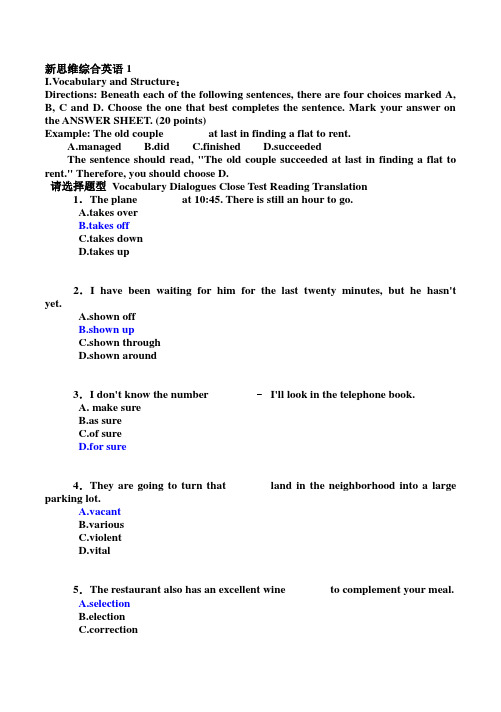
新思维综合英语1I.Vocabulary and Structure:Directions: Beneath each of the following sentences, there are four choices marked A, B, C and D. Choose the one that best completes the sentence. Mark your answer on the ANSWER SHEET. (20 points)Example: The old couple at last in finding a flat to rent.A.managedB.didC.finishedD.succeededThe sentence should read, "The old couple succeeded at last in finding a flat to rent." Therefore, you should choose D.请选择题型Vocabulary Dialogues Close Test Reading Translation1.The plane at 10:45. There is still an hour to go.A.takes overB.takes offC.takes downD.takes up2.I have been waiting for him for the last twenty minutes, but he hasn't yet.A.shown offB.shown upC.shown throughD.shown around3.I don't know the number–I'll look in the telephone book.A. make sureB.as sureC.of sureD.for sure4.They are going to turn that land in the neighborhood into a large parking lot.A.vacantB.variousC.violentD.vital5.The restaurant also has an excellent wine to complement your meal.A.selectionB.electionC.correctionD.reflection6.Could you tell me the tissues are, please?A.whatB.whereC.whichD.when7.How long?A. have you got marriedB.you got marriedC.have you been marriedD.did you marry8.You will find rice at every meal in the South of China.A.servedB.servingC.be servedD.serves9.She opened the door the fresh air to come in.A.ofB.forC.intoD.let10.All is a continuous supply of the basic necessities of life.A.that is neededB.what is neededC.the thing neededD.our needsII.Situational Dialogues:Directions: Choose A, B or C to complete each conversation, using the sentences below. Mark your answer on the ANSWER SHEET. (20 points)Example:- Oh, look. Joni Mitchell is in town.- .- What? She's one of the greatest folk singers in the world!Who's that? I've never heard of her.Sure, I'm in town.Yes, I'm glad she's coming.Answer A is correct because the conversation should read,"- Oh, look. Joni Mitchell is in town.- Who's that? I've never heard of her.- What? She's one of the greatest folk singers in the world!"请选择题型Vocabulary Dialogues Close Test Reading Translation11.–Thanks very much. You've been very helpful.–.A.No, thanks.B.You are right. You can say it again.C.Don't mention it. Any time.12.–How about joining us? It is really a wonderful feeling.–.A.Well, I was planning to work on Saturday. But I change my mind now.B.Great! It doesn't sound like that great when I was there last time.C.Really? I thought the steak was terrible.13.–Hello, Chris? This is Lee..–Oh, that's O.K. I was just setting the table.A.What are we going to have for dinner?B.I hope I'm not calling at dinner time.C.Jane invites us over for dinner tonight.14.–Do you know where Liberty Street is? –It's off Oak Street, near the park.–.–I don't know exactly. Perhaps every five minutes or so.A.The park? Which one do you mean?B.Do you have any idea where Pine Street is?C.By the way, do you know how often the Number 5 bus runs normally?15.–Could you tell me which bus goes to the Fine Arts Museum?—.A.Sorry, I've never been there.B.You can always take a taxi.C.I think No. 16 is OK.16.–Do you have any plans for the weekend?–.A.It will be fine on the weekend.B.It depends on the weather.C.I went to the cinema last weekend.17.–Do you know what you're going to order?–.A.It smells awful.B.It tastes delicious.C.I can't make up my mind.18.–If the weather is good, I might play tennis. What about you?–.A.What would you like order?B.I went to the cinema yesterday.C.I'm not sure. I may just stay home.19.–Do you ever go back to Cambridge?–.–I don't know exactly. Perhaps every five minutes or so.A.Not very often.B.Let's keep in touch.C.Not again.20.–How about working fifteen more minutes? Then we can order out for pizza.—.A.Sounds great. I am so hungry I could eat a horse.B.Good idea. I need to leave immediately.C.Let's move to other topics.III.Close Test:Directions: For each numbered blank in the following passage, there are four choices marked A, B, C and D. Choose the best one and mark your answer on the ANSWER SHEET. (20 points) 请选择题型Vocabulary Dialogues Close Test Reading TranslationHenry's job was to examine cars whichcrossed the frontier to make21that they werenot smuggling (走私) anything into the country.Every evening, except at weekends, he 22see a factory worker coming up the hill towardsthe frontier, pushing a bicycle with a big load ofold straw on it. When the bicycle reached thefrontier, Henry 23to stop the man and makehim take the straw off and untie it. Then he wouldexamine the 24very carefully to see if hecould find anything, after which he would look inall the man's pockets 25he let him tie thestraw again. The man would then put it on hisbicycle and go off down the hill with it. AlthoughHenry was always 26to find gold or jewelry orother valuable things hidden in the straw, henever found any.Then one evening, after he had looked27the straw as usual, he said to him,"Listen. I know that you are smuggling thingsacross this frontier. Won't you tell me what it isthat you are bringing into the country so 28?I'm an oldman, and today's my last day on thejob. Tomorrow I'm going to 29. I promisethat I shall not tell anyone if you tell me whatyou've been smuggling." The factory workerdid not sayanything for 30. Then he smiled,turned to Henry and said quietly, "Bicycles."21. A.known B.clearC.obviousD.sure--------------------------------------------------------------------------------22. A.would B.mustC.mightD.should--------------------------------------------------------------------------------23. A.had edC.wantedD.sure--------------------------------------------------------------------------------24. A.bicycle B.hillC.strawD.worker--------------------------------------------------------------------------------25. A.when B.beforeC.whileD.as--------------------------------------------------------------------------------26. A.thinking B.suspectingC.expectingD.insisting--------------------------------------------------------------------------------27. A.thoroughly B.throughC.downD.up--------------------------------------------------------------------------------28. A.carefully B.successfullyC.obviouslyD.silently--------------------------------------------------------------------------------29. A.return B.retreatC.retireD.rest--------------------------------------------------------------------------------30. A.short while B.a periodC.few minutesD.some timeIV. Reading ComprehensionDirections: Each of the passages below is followed by some questions. For each question there are four answers marked A, B, C and D. Read the passages carefully and choose the best answer to each of the questions. Mark your answer on the ANSWER SHEET. (20 points)请选择题型Vocabulary Dialogues Close Test Reading TranslationQuestions 31~35 are based on the Passage 1.Passage 1Learning the language of a country isn't enough. If you know the manners of your foreign friends, you will probably be surprised just how different they can be from your own.A visitor to India should remember it is impolite there to use the left hand for passing food at the table. The left hand is for washing yourself. Also in India, you might see a man shaking his head at another to show that he is disagreeing. But inmany parts of India a side-to-side movement of the head is to show agreement. In Bulgaria you shake your head to show "yes"—a nod shows "no".In Europe it is quite usual to cross your legs while sitting and talking to someone, even at an important meeting. But doing this could cause offence to a Thailander. Touching the head of a grown-up is also not done in Thailand.Knowing about manners is useful when you are traveling, and you also need to know the language used to express the customs.31. If you are staying in India, you'd better.A. not use your left hand to pass food at the tablee your left hand to pass food at the tableC.not use your left hand to wash yourselfe your left hand at all times32. To shake your head means "Yes.A.in IndiaB.in EuropeC.in BulgariaD.in Thailand33. You can easily make a Thailander angry by.A.touching his headB.crossing your legs while talking to himC.shaking your headD.nodding your head34. The writer thinks that to know about a country well one must.A. know the language of the countryB.know the manners of the countryC.know the manners better than the languageD.know both the language and the manners35.We can learn from the passage that.A.different countries have different mannersB.the manners in Thailand are the same as those in IndiaC.one should be careful not to cross legs in EuropeD.one should not touch a grown-up's head in IndiaIV. Reading Comprehension请选择题型Vocabulary Dialogues Close Test Reading TranslationQuestions 36~40 are based on the Passage 2.Passage 2Last night after dinner I told my family the bad news. I had this class assignment to monitor (监控)our use of energy at home for a week. Our family got an F.Tuesday night my brother watched the same two hour movie on his TV set that we were watching in the living room. Thursday Mom ran an entire dishwashing cycle for 3 cups, 2 plates, a knife and 3 little spoons. That's a lot of electricity and hot water down the drain(下水道).Dad drives 28 miles back and forth to work alone. Two men he works with live right nearby, and they could carpool (合伙使用汽车) and save about a thousand gallons of gas a year. And me, I'm guilty too. I went out and left the radio blaring(喇叭大声地响)in my room all Saturday morning.So last night at the dinner table we all agreed to do everything we could to conserve(节约)energy. Faster showers. Lower thermostats (温度调节器). Fuller care. It is a fact that this country's using up energy faster than we produce it. I read that we may run out of oil-forever-in thirty years. So terrible!Unless every person in every house on every block does his part, the future looks pretty dim.I'm getting more and more concerned about the future. Because that's where I'm going to be.36. The people in this family.A. wasted energy unconsciouslyB.had the radio on when they went outC.watched TV programs separatelyD.liked to use hot water while washing dishes37. It is a fact that.A.oil is getting less and lessB.the future is terrible with such a serious problemC.the government tries to solve the problem within several yearsD.the county will soon use up energy if we keep wasting like this38. If every person in every house.A.rides a bike instead of a car, everything will be OKB.stops using hot water washing dishes, we'll waste less energyC.makes efforts to save energy, the future will be brightD.has company while watching TV, nothing will go wrong39. What's the main idea that the author want to convey in this passage?A.There is a waste at home.B.To waste is a serious problem.C.Families will run out of energy.D.We should conserve energy.40. The suitable title for this passage is.A.What an Assignment!B.What a Waste!C.How to Save Energy?D.The Future is Dim.V. TranslationDirections: Put each of the following sentences into English or Chinese, using the word(s) given in the bracket if any. Write your answer on the ANSWER SHEET. (20 points)请选择题型Vocabulary Dialogues Close Test Reading Translation41. The attention to details assures you that the setting and service are as perfect as your meal, whether it's a quiet dinner for two, or a business lunch.参考答案:无论静谧的二人晚餐还是商务午餐,细致入微的服务都会保证这里的环境和服务与您所点的食物一样品质优良。
大学新应用英语教材答案
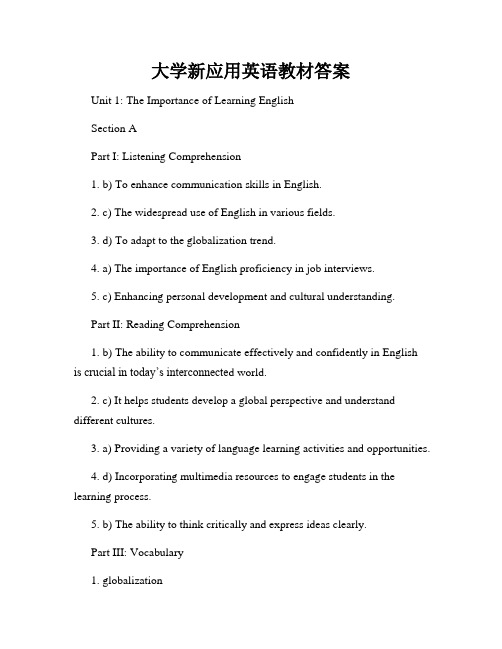
大学新应用英语教材答案Unit 1: The Importance of Learning EnglishSection APart I: Listening Comprehension1. b) To enhance communication skills in English.2. c) The widespread use of English in various fields.3. d) To adapt to the globalization trend.4. a) The importance of English proficiency in job interviews.5. c) Enhancing personal development and cultural understanding.Part II: Reading Comprehension1. b) The ability to communicate effectively and confidently in English is crucial in today’s interconnecte d world.2. c) It helps students develop a global perspective and understand different cultures.3. a) Providing a variety of language learning activities and opportunities.4. d) Incorporating multimedia resources to engage students in the learning process.5. b) The ability to think critically and express ideas clearly.Part III: Vocabulary1. globalization2. proficiency3. interaction4. diverse5. acquirePart IV: Listening and Speaking1. To enhance listening and speaking skills in real-life situations.2. They can learn authentic English pronunciation.3. Students can practice different types of spoken English.4. It helps students build confidence in using English.5. It provides opportunities for students to interact and communicate with native speakers.Section BPart I: Reading Comprehension1. effective communication skills in English2. develop critical thinking skills3. gain knowledge and information from a variety of sources4. deepen cultural understanding5. enhance career prospectsPart II: Vocabulary1. integrate2. cognitive3. competence4. academic5. reinforcePart III: Listening, Speaking, and Writing1. To improve listening and speaking skills in various contexts.2. It provides opportunities for students to express their ideas and opinions.3. By writing essays and reports, students can analyze and organize information effectively.4. It helps students develop their creativity and critical thinking skills.5. Students can improve their grammar and vocabulary through writing exercises.Unit 2: Education and Career PlanningSection APart I: Listening Comprehension1. b) To broaden their knowledge and skills.2. c) It provides opportunities for personal and professional growth.3. d) By acquiring practical skills and knowledge in their chosen field.4. a) The ability to adapt to changes in the job market.5. c) The importance of acquiring transferable skills.Part II: Reading Comprehension1. a) To prepare them for the future job market.2. b) It provides students with practical skills and hands-on experience.3. d) The ability to adapt to changes and challenges in the workplace.4. c) Continuous learning and skill development.5. b) Building a strong professional network.Part III: Vocabulary1. qualification2. internship3. curriculum4. mentor5. entrepreneurPart IV: Listening and Speaking1. To provide students with practical skills and hands-on experience in their chosen field.2. It helps students develop a professional network and gain industry insights.3. By participating in internships, students can apply theoretical knowledge to real-world situations.4. It prepares students for the challenges and changes in the job market.5. Students can learn from experienced professionals and mentors in their field.Section BPart I: Reading Comprehension1. transferable skills2. adaptability3. networking4. entrepreneurship5. continuous learningPart II: Vocabulary1. prospective2. portfolio3. credentials4. negotiable5. advancementPart III: Listening, Speaking, and Writing1. To help students explore different career paths and make informed decisions.2. By conducting interviews, students can gain insights into various professions.3. Students can develop their presentation skills and enhance their oral communication abilities.4. Writing resumes and cover letters can help students showcase their qualifications and experiences.5. It assists students in developing effective job search strategies and interview techniques.(Note: This is a sample response and can be adapted and revised to suit the specific requirements of the article.)。
新思维综合英语(1) Unit 10(66-72)
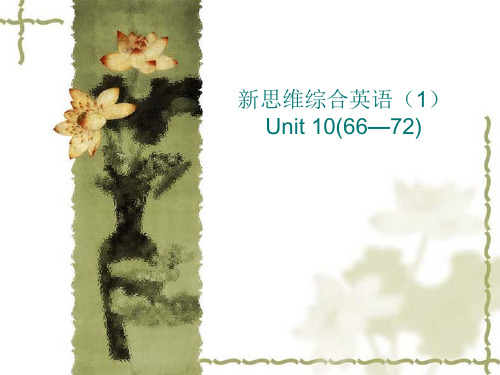
B 1. What’s more about the one-bedroom apartment for $650 a month? 2. How is the public transportation?
3. Will Debbie accept the studio apartment? Why or why not?
新思维综合英语(1) Unit 10(66—72)
Unit10 Learning objectives
How to talk about the size of an apartment 如何谈论公寓大小
How to ask about apartments 如何询问公寓情况 How to talk about transportation 如何谈论交通
3. living room 起居室。 4. pretty: adv. fairly, moderately, 相当,颇为。 pretty much, almost, 几乎,差不多。如: The car is pretty much new. 这辆车几乎是 全新的。 5. eighteen by twenty-three, 18 X 23, 注意 介词by来表示长乘以宽。 6. Foot,“英尺”,复数是feet。 1英尺 = 30.48厘米。
B I’m calling about the apartment you advertised. Is it still available? 1. call, 打电话, 可以作及物动词, 也可以作不及物动词。I called you yesterday. 昨天我给你打了电话。 I’ll call again later. 稍后再给你打电话。to call + about something 打电话询问某事。 2. available: (1) that can be used or obtained 可用的,可以 得到的;(2) free to be seen, talked to, etc. 有空的,可会见 的,可与之交谈的。如:I’m available in the afternoon. 我下午有空。 Could you tell me more about it? 用could you tell me来询问信息,口头交流和书面文中都很 常见。用could不用can,很委婉的说法。tell somebody about something, 告诉某人某事。 sure回答请求,表示没问题。
新思维大学英语教材答案
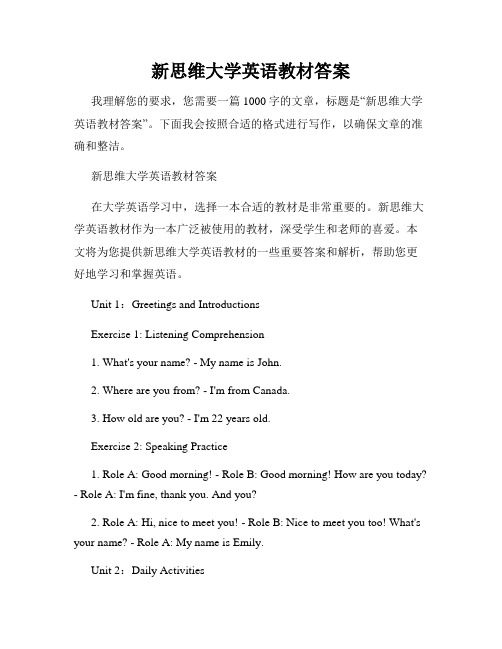
新思维大学英语教材答案我理解您的要求,您需要一篇1000字的文章,标题是“新思维大学英语教材答案”。
下面我会按照合适的格式进行写作,以确保文章的准确和整洁。
新思维大学英语教材答案在大学英语学习中,选择一本合适的教材是非常重要的。
新思维大学英语教材作为一本广泛被使用的教材,深受学生和老师的喜爱。
本文将为您提供新思维大学英语教材的一些重要答案和解析,帮助您更好地学习和掌握英语。
Unit 1:Greetings and IntroductionsExercise 1: Listening Comprehension1. What's your name? - My name is John.2. Where are you from? - I'm from Canada.3. How old are you? - I'm 22 years old.Exercise 2: Speaking Practice1. Role A: Good morning! - Role B: Good morning! How are you today? - Role A: I'm fine, thank you. And you?2. Role A: Hi, nice to meet you! - Role B: Nice to meet you too! What's your name? - Role A: My name is Emily.Unit 2:Daily ActivitiesExercise 1: Vocabulary1. What do you usually do in the morning? - I usually brush my teeth and have breakfast.2. What time do you go to bed? - I go to bed at around 11 PM.Exercise 2: Grammar1. He goes to the gym every day to keep fit.2. I have studied English for five years.Unit 3:TravelingExercise 1: Reading Comprehension1. The passage is mainly about different modes of transportation.2. The fastest way to travel long distances is by plane.Exercise 2: Listening Comprehension1. What is the man's occupation? - He is a flight attendant.2. Where is the woman going? - She is going to a business conference in New York.Unit 4:Food and DrinksExercise 1: Vocabulary1. What's your favorite fruit? - My favorite fruit is apple.2. Do you like drinking coffee? - No, I prefer tea.Exercise 2: Writing PracticeWrite a short paragraph about your favorite dish.My favorite dish is spaghetti carbonara. It is an Italian pasta dish made with eggs, cheese, bacon, and black pepper. The creamy sauce combinedwith the savory taste of bacon is simply delicious.通过以上内容,您可以看到新思维大学英语教材中的一些答案和解析。
《新思维高职高专英语综合教程(第一册)》电子教案1 Unit 7
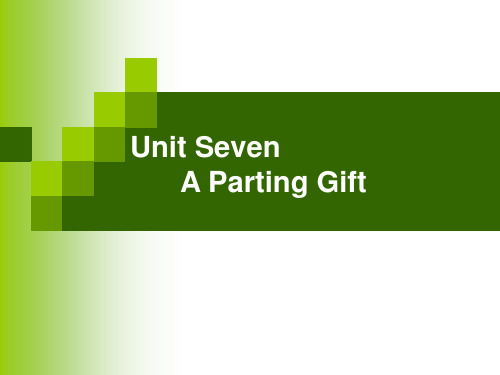
Dialogue
(On the street, Elizabeth ran across Joanna, her roommates in university. They went into a café.)
resume [rezju:'mei] n. a short summary or account of sth.简历;履历
leave for set out for a place出发前往 farewell [feə'wel] n. the act of saying goodbye to
somebody 告别;辞行
Unit Seven A Parting Gift
Contents
Section One Sounds of English Section Two Language Building
Dialogue One Dialogue Two Section Three Intensive Reading Section Four Know-how Sharing Section Five Information Exchanging
treat [tri:t] v. to pay for something that somebody/you will enjoy and that you do not usually have or do 招待;款待;请(客);买 (可享受的东西)
Find the Information I. Listen to the dialogue and find the information as quickly as possible.
新思维英语综合教程1
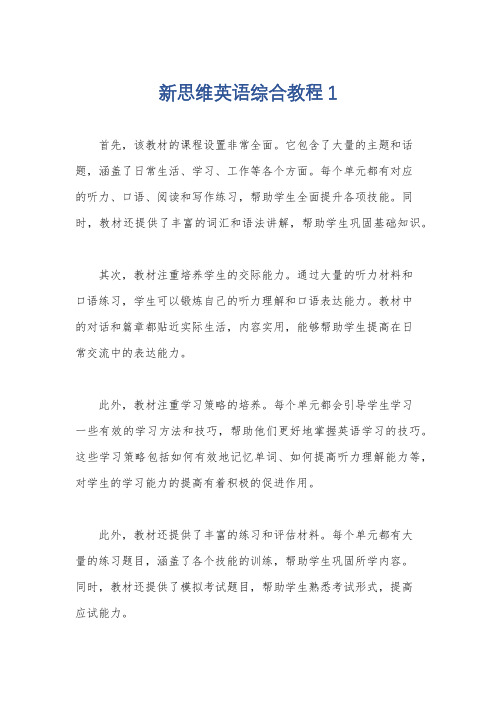
新思维英语综合教程1
首先,该教材的课程设置非常全面。
它包含了大量的主题和话题,涵盖了日常生活、学习、工作等各个方面。
每个单元都有对应
的听力、口语、阅读和写作练习,帮助学生全面提升各项技能。
同时,教材还提供了丰富的词汇和语法讲解,帮助学生巩固基础知识。
其次,教材注重培养学生的交际能力。
通过大量的听力材料和
口语练习,学生可以锻炼自己的听力理解和口语表达能力。
教材中
的对话和篇章都贴近实际生活,内容实用,能够帮助学生提高在日
常交流中的表达能力。
此外,教材注重学习策略的培养。
每个单元都会引导学生学习
一些有效的学习方法和技巧,帮助他们更好地掌握英语学习的技巧。
这些学习策略包括如何有效地记忆单词、如何提高听力理解能力等,对学生的学习能力的提高有着积极的促进作用。
此外,教材还提供了丰富的练习和评估材料。
每个单元都有大
量的练习题目,涵盖了各个技能的训练,帮助学生巩固所学内容。
同时,教材还提供了模拟考试题目,帮助学生熟悉考试形式,提高
应试能力。
总的来说,《新思维英语综合教程1》是一本很好的英语综合
教材。
它全面涵盖了各个技能的训练,注重培养学生的交际能力和
学习策略,同时提供了丰富的练习和评估材料。
通过使用这本教材,学生可以全面提升自己的英语能力,更好地应对日常生活和学习中
的英语使用。
新思维综合英语1模拟试题四
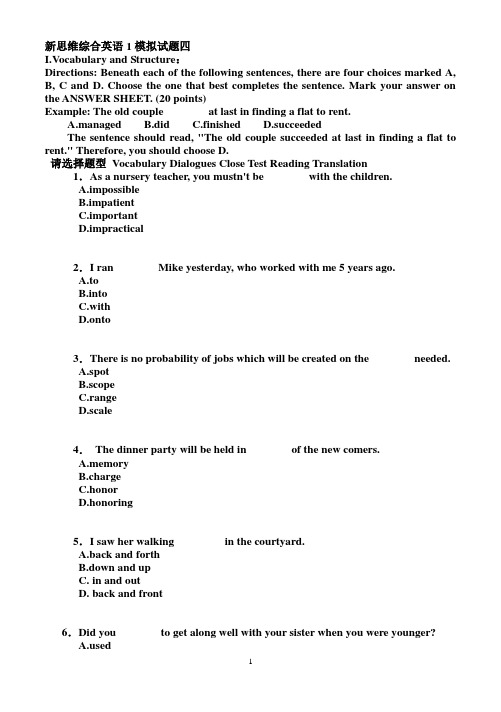
新思维综合英语1模拟试题四I.Vocabulary and Structure:Directions: Beneath each of the following sentences, there are four choices marked A, B, C and D. Choose the one that best completes the sentence. Mark your answer on the ANSWER SHEET. (20 points)Example: The old couple at last in finding a flat to rent.A.managedB.didC.finishedD.succeededThe sentence should read, "The old couple succeeded at last in finding a flat to rent." Therefore, you should choose D.请选择题型Vocabulary Dialogues Close Test Reading Translation1.As a nursery teacher, you mustn't be with the children.A.impossibleB.impatientC.importantD.impractical2.I ran Mike yesterday, who worked with me 5 years ago.A.toB.intoC.withD.onto3.There is no probability of jobs which will be created on the needed.A.spotB.scopeC.rangeD.scale4.The dinner party will be held in of the new comers.A.memoryB.chargeC.honorD.honoring5.I saw her walking in the courtyard.A.back and forthB.down and upC. in and outD. back and front6.Did you to get along well with your sister when you were younger?edingeD.to use7.I am going with Jim and some of my good friends on Saturday.A.fishingB.for fishingC. fishedD.fish8.that they will be denied a raise, many people never request one.A.FearingB.Being fearedC.FearedD.Being fearing9.When, before you start a meal, you will be given a basket with a hot towel in it.A.dine outB.dining outC.dined outD.you dining out10.Did you have in mind?A.special anythingB.anything specialC.nothing specialD.special nothingII.Situational Dialogues:Directions: Choose A, B or C to complete each conversation, using the sentences below. Mark your answer on the ANSWER SHEET. (20 points)Example:- Oh, look. Joni Mitchell is in town.- .- What? She's one of the greatest folk singers in the world!Who's that? I've never heard of her.Sure, I'm in town.Yes, I'm glad she's coming.Answer A is correct because the conversation should read,"- Oh, look. Joni Mitchell is in town.- Who's that? I've never heard of her.- What? She's one of the greatest folk singers in the world!"请选择题型Vocabulary Dialogues Close Test Reading Translation11.–How about joining us? It is really a wonderful feeling.–.A.Well, I was planning to work on Saturday. But I change my mind now.B.Great! It doesn't sound like that great when I was there last time.C. Really? I thought the steak was terrible.12.–Do you know what time it is?–.A.It's time to have our lunch.B.It's half past twelve. We have to leave here now.C.What do you want to do by asking that?13.–Do you mind my opening the window? It's so hot today.–.A.Yes, you can do.B. Yes, it doesn't matter.C.No, not at all.14.–May I help you find something, or are you just looking?–.A.I am trying to find something for my daughter.B.No, dinner is nearly ready.C.That's right. I'll have that blue one.15.–How do I get to the train station from here?–.A.That's very difficult to talk about.B.You can either drive or take a bus.C.You can't go there, but it's a long way to go.16.–Do you live in Chicago now?–.A.Chicago is a busy and noisy city.B.Chicago is far away from here.C.Well, I'm thinking of moving here.17.–I've got 2 tickets for the match. Would you like to go with me?–.A.How about the match last night?B.The match must be exciting.C.Why not? Let's go together.18.–Let me help you open that bottle.–.A.Never mind. I have no idea about it.B.Thanks. I really appreciate it.C.Thank you for telling me about it19.–Have you visited Hong Kong?–.A.Sorry, I'm planning to go to New York.B.No, but I've heard it's an exciting city.C.Yes, it's a long way to my hometown.20.–I'm going to the grocery store. Is there anything you need?—.A. Could you pick up a bottle of wine?B.No, I don't care.C. I have already visited them.III.Close Test:Directions: For each numbered blank in the following passage, there are four choices marked A, B, C and D. Choose the best one and mark your answer on the ANSWER SHEET. (20 points) 请选择题型Vocabulary Dialogues Close Test Reading TranslationA land free from destruction, plus wealth, natural resources, and labor supply(劳动力供应)all these were important21in helping England become the center for the Industrial Revolution. But they were not enough. Something22was needed to start the industrial progress. That “something special”was men –creative individuals who could invent machines, find new23of power, and establish business organizations to reshape society.The men who created the machines of the Industrial Revolution24from many backgrounds and many occupations. Many of them were better inventors than scientists. A man who is a 25scientist is primarily interested in doing his research accurately. He is not necessarily working 26that his findings can be used.An inventor, or one interested in applied science, is usually trying to make something that has a concrete27. He may try to solve a problem by using theories of science or by experimenting through trial and error. Regardless of his method, he is working to obtain a28result: the construction of a harvesting machine, the burning of a light bulb, or one of those other objects.Most people who29the machine of the Industrial Revolution were inventors, not trained scientists. A few were both scientists and inventors. Even those, 30little or no training in science, who made some inventions must have benefited from the groundwork (基础) scientists have laid.21. A.cases B.reasonsC.factorsD.situations22. A.else B.nearC.extraD.similar23. A.origins B.sourcesC.basesD.discoveries24. A.came B.arrivedC.stemmedD.appeared25. A.genuine B.practicalC.pureD.clever26. A.now B.andC.orD.so27. A.plan B.ideaC.theoryD.means28. A.single B.soleC.specializedD.specific29. A.proposed B.developedC.suppliedD.offered30. A.by B.withC.withoutD.forIV. Reading ComprehensionDirections: Each of the passages below is followed by some questions. For each question there are four answers marked A, B, C and D. Read the passages carefully and choose the best answer to each of the questions. Mark your answer on the ANSWER SHEET. (20 points)请选择题型Vocabulary Dialogues Close Test Reading TranslationQuestions 31~35 are based on the Passage 1.Passage 1The water we drink and use is running short in the world. We all have to learn how to stop wasting our limited water. One of the steps we should take is to find ways of reusing it. Experiments have already been done in this field.Today in most large cities, fresh water is used only once, and then it runs into waste system. But it is possible to pipe the used water to a purifying factory. There it can be filtered and treated with chemicals so that it can be used again, just as it were fresh from a spring.But even if every large city purified and reused its water, we still would not have enough. Then we could turn to the oceans. All we'd have to do to make use of the seawater on earth is to get rid of the salt. This process is called desalinization, and it is already in practice in many parts of the world.31. The way to stop wasting our limited water is to according to the passage.A. do experiments with waterB.purify the used water and reuse ite fresh water once againD.make use of seawater32.The following tells us how to purify the used water. The first step of the purifying process is to.A.have the used water filteredB.put chemicals in itC.pipe it to the usersD.pipe the used water to be purified to a factory33. There wouldn't be enough water for us if we didn't.A.turn to the oceans for more waterB.reuse used water and make use of seawaterC.desalt seawaterD.take steps to reuse all water on earth34. The word "it" in the last sentence refers to.A. seawaterB.purified waterC.the process of getting rid of the salt in seawaterD.the process of collecting salt from the sea oceans35.The best title for the passage is.A.How to Reuse WaterB.Two Solutions to the Problem of Water ShortageC.Stop Wasting Our Limited WaterD.How to Make Use of SeawaterIV. Reading Comprehension请选择题型Vocabulary Dialogues Close Test Reading TranslationQuestions 36~40 are based on the Passage 2.Passage 2Have you ever noticed advertisements which say “Learn a foreign language in six weeks, or your money back! From the first day your pronunciation will be excellent. Just send…”and so on? Of course, it never happens quite like that. The only language that is easy to learn is the mother tongue. Think how much practice that gets! Before the Second World War people usually learnt a foreign language in order to read the literature of the country. Now speaking a foreign language is what most people want. Every year many millions of people start learning one.Some people try at home, with books and records or tapes; some use radio or television programmes; others go to evening classes. If they use the language only twice or three times a week, learning it will take a long time. A few people try to learn a language fast by studying for six or more hours a day. It is clearly easier to learn the language in the country where it is spoken. However, most people cannot afford this, and for many it is not necessary. They need the language in order to do their work better. For example, scientists and doctors chiefly need to be able to read books and reports in the foreign language. Whether the language is learnt quickly or slowly, it is hard work. Machines and good books will help, but they cannot do the student's work for him.36. The advertisements say it would be easy to.A. speak your native language betterB. keep in mind any foreign languageC. learn a foreign language within several weeksD. learn by heart a foreign language37. Nowadays most people want to learn according to the text.A.about the country where a language is spokenB.to speak a foreign languageC.to read essays in the foreign languageD.to write in the foreign language38. Before the 2nd World War people usually learnt a foreign language in orderto.municate with their foreign friendsB.read the foreign newspaperC.read the literacy works of the countryD.talk with their foreign friends39. If you only use the language twice or three times a week, .A.it is impossible to learn it wellB.it will take a long time to learn the foreign languageC.you will never learn the language wellD.perhaps you will learn harsh language40. No matter how quickly or slowly you want to learn a foreign language, you need to.A.read booksB.read reportsC.visit the countryD.work hardV. TranslationDirections: Put each of the following sentences into English or Chinese, using the word(s) given in the bracket if any. Write your answer on the ANSWER SHEET. (20 points)请选择题型Vocabulary Dialogues Close Test Reading Translation41. Graphologists believe that you can learn a lot about people's personalities by looking at the way they write.参考答案:笔迹专家们认为他们可以根据人们写字的方式看出他们的个性来。
新思维应用型本科教材英语听力教程2答案

新思维应用型本科教材英语听力教程2答案1、The children ______ visiting the museum. [单选题] *A. look overB. look forward to(正确答案)C. look forD. look after2、Experts are making an investigation on the spot. They want to find a way to()the tower. [单选题] *A. Restore(正确答案)B. resumeC. recoverD. reunite3、At nine yesterday morning, I ______ an English class while they ______ a PE class.()[单选题] *A. was having; were having(正确答案)B. had; hadC. was having; hadD. had; were having4、You have coughed for several days, Bill. Stop smoking, _______ you’ll get better soon. [单选题] *A. butB. afterC. orD. and(正确答案)5、This year our school is _____ than it was last year. [单选题] *A. much more beautiful(正确答案)B. much beautifulC. the most beautifulD. beautiful6、There are sixty _______ in an hour. [单选题] *A. hoursB. daysC. minutes(正确答案)D. seconds7、Be careful with the knife. You may hurt _______. [单选题] *A. himselfB. ourselvesC. myselfD. yourself(正确答案)8、The paper gives a detailed()of how to create human embryos (胚胎)by cloning. [单选题] *A. intentionB. description(正确答案)C. affectionD. effort9、I don't know the man _____ you are talking about. [单选题] *A. who'sB. whose(正确答案)C. whomD. which10、While my mother _______ the supper, my father came back. [单选题] *A. cooksB. is cookingC. was cooking(正确答案)D. has cooked11、13.________ it rains heavily outside, Lily wants to meet her children at once. [单选题]*A.IfB.Although (正确答案)C.WhenD.Because.12、-We’ve spent too much money recently–well,it isn’t surprising. Our friend and relatives_______around all the time [单选题] *ingB. had comeC. were comingD have been coming(正确答案)13、I am worried about my brother. I am not sure _____ he has arrived at the school or not. [单选题] *A. whether(正确答案)B. whatC. whenD. how14、There is a popular belief _____schools don’t pay any attention to spelling. [单选题] *A.that(正确答案)B.whichC.whatD.whose15、_____you may do, you must do it well. [单选题] *A.WhichB.WheneverC.Whatever(正确答案)D.When16、David ______ at home when I called at seven o’clock yesterday evening. ()[单选题] *A. didn’tB. doesn’tC. wasn’t(正确答案)D. isn’t17、We moved to the front row_____we could hear and see better. [单选题] *A. so asB. so that(正确答案)C. becauseD. such that18、Many people prefer the bowls made of steel to the _____ made of plastic. [单选题] *A. itB. ones(正确答案)C. oneD. them19、_____ the plan carefully,he rejected it. [单选题] *A. To have consideredB.To considerC. Having considered(正确答案)D. Considering20、Henry lives happily with his three cats. _______ of them are part of his family. [单选题] *A. NoneB. BothC. All(正确答案)D. Neither21、Everyone knows that the sun _______ in the east. [单选题] *A. fallsB. rises(正确答案)C. staysD. lives22、She’s _______ with her present _______ job. [单选题] *A. boring; boringB. bored; boredC. boring; boredD. bored; boring(正确答案)23、We had a(an)_____with him about this problem last night. [单选题] *A.explanationB.impressionC.exhibitionD.discussion(正确答案)24、66.—How much meat do you want?—________.[单选题] *A.Sorry, there isn't anyB.I can't give you anyC.Half a kilo, please(正确答案)D.Twelve yuan a kilo25、15.The restaurant ________ many complaints because of the terrible service since last month. [单选题] *A.receivesB.is receivingC.has received(正确答案)D.will receive26、The black coal there shows a sharp()white snow. [单选题] *A. contract withB. content withC. contact toD. contrast to(正确答案)27、--_______ do you have to do after school?--Do my homework, of course. [单选题] *A. What(正确答案)B. WhenC. WhereD. How28、It was _____ that the policy of reform and opening up came into being in China. [单选题] *A. in the 1970s(正确答案)B. in 1970sC. in the 1970s'D. in 1970's29、Bliss, who worked in an information centre, began to work on the book in 1 [单选题] *A. 策划B. 上班C. 写作(正确答案)D. 销售30、—Look at those purple gloves! Are they ______, Mary?—No, they aren’t. ______ are pink. ()[单选题] *A. you; IB. your; MyC. yours; Mine(正确答案)D. you; Me。
- 1、下载文档前请自行甄别文档内容的完整性,平台不提供额外的编辑、内容补充、找答案等附加服务。
- 2、"仅部分预览"的文档,不可在线预览部分如存在完整性等问题,可反馈申请退款(可完整预览的文档不适用该条件!)。
- 3、如文档侵犯您的权益,请联系客服反馈,我们会尽快为您处理(人工客服工作时间:9:00-18:30)。
List words that best describe the friends you are expecting for.
For example: friendly
1
2
3
4
PART 1
Task Two
INDIVIDUAL WORK
Explain why each characteristic is important for a friend. For example: friendly—a friendly person tends to get along well with everyone
Unit One
MEETING NEW FRIENDS
PART 1
PART 2 PART 3 PART 4 PART 5
INDIVIDUAL WORK
TEAMWORK
CLASS DISCUSSION
PUBLIC SPEAKING
SELF-ASSESSMENT
PART 1
Task One
INDIVIDUAL WORK
PART 1
Task Three
INDIVIDUAL WORK
(B) Make sure you know how to spell and pronounce all the above words. Then write a sentence for each word. The sentence must show you understand the meaning of the word. For example: He is a considerate person. This is not a useful sentence because it does not reveal anything about what “considerate” means. A good sentence might look like this: He is a considerate roommate because he tries to use the headphone to listen to his favorite songs so others can focus on their homework. 6. 7. 8. 9. 10.
Unit One
MEETING NEW FRIENDS
LEARNING OBJECTIVES
In this unit, students will be able to: 1. talk about an unforgettable roommate or classmate; 2. share their life on campus; 3. introduce themselves to a roommate, a classmate or a schoolmate.
7.
8. 9.
smart
humorous diligentg.h. i源自 j.hard-working
like to meet and spend time with other people making you laugh having a great desire to be successful
2.
3. 4. 5. 6.
resourceful
open-minded friendly amiable ambitious
b.
c. d. e. f.
behaving in a kind way towards others
accessible to new ideas clever showing thought to feelings or rights of others pleasant and friendly
1
2
3
4
PART 1
Task Three
INDIVIDUAL WORK
(A) Match the words on the left with the meanings or definitions on the right. These are useful words to describe another person, like a new friend 1. considerate a. outgoing
10. sociable
PART 1
Task Three
INDIVIDUAL WORK
(B) Make sure you know how to spell and pronounce all the above words. Then write a sentence for each word. The sentence must show you understand the meaning of the word. For example: He is a considerate person. This is not a useful sentence because it does not reveal anything about what “considerate” means. A good sentence might look like this: He is a considerate roommate because he tries to use the headphone to listen to his favorite songs so others can focus on their homework. 1. 2. 3. 4. 5.
Unit One
MEETING NEW FRIENDS
INTRODUCTION
We often say we do not choose our parents. We accept who they are. Coming to college we do not choose who our roommates/ classmates/ schoolmates are. Some people believe knowing the students’ birth signs will help you to know the students and matching students with the right birth signs will help with building better relationships and the ability to work with the right partners. Do you think so? Imagine traveling together in a ship with your new friends with the common goal to work together to arrive at the destination safely somewhere in the world.
